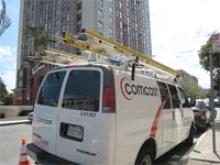Putting Shareholders and Profits ahead of the Community
One of the key differences between community owned networks and those driven by profit is customer service. Community-driven providers spend more and create more jobs in the community to ensure subscribers' needs are met. The massive private companies instead choose to outsource the jobs to call centers (sometimes in the U.S., sometimes outside) in order to cut costs (and jobs - see the report from the Media and Democracy Coalition).
We've seen a few examples of the big carrier approach in this arena - as when Cablevision billed apartment residents $500 after a fire for the DVR that was consumed in the blaze... stay classy, Cablevision.
Another difference between community networks and the big carriers is that big carriers see little reason to upgrade their anemic networks to ensure communities remain competitive in the digital age. As Free Press has long documented [pdf] big companies like AT&T have been investing less in recent years as the U.S. has continued falling in international broadband rankings.
Up here in Minnesota, Qwest has invested in FTTN - what they call fiber-to-the-node. We call it Fiber-to-the-Nowhere. For those who happen to live very close to the node, they get slightly faster DSL speeds that are still vastly asymmetrical. Meanwhile, Qwest has branded this modest improvement for some as "fiber-optic fast" and "heavy duty (HD)" Internet, misleading customers into thinking they are actually going to get faster speeds than Comcast's DOCSIS 3.
Much as I hate to praise the middling DOCSIS 3 upgrade, it certainly offers a better experience than any real results we have seen with Qwest. But as we carefully documented in this report, community networks offer more for less.
Two friends recently moved to Qwest. One, J, was convinced by a Qwest salesperson that Qwest would be much faster so he signed up for a 20Mbps down package.



